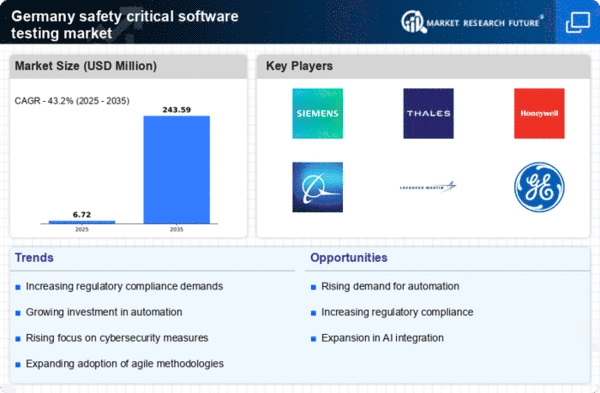Growing Cybersecurity Concerns
The escalating concerns regarding cybersecurity threats significantly impact the safety critical-software-testing market. In Germany, industries such as finance, healthcare, and transportation are increasingly vulnerable to cyberattacks, necessitating robust testing protocols to safeguard sensitive data. The market is projected to grow by approximately 10% annually as organizations prioritize cybersecurity in their software testing processes. This trend is particularly pronounced in sectors where software failures can lead to catastrophic consequences. As a result, companies are investing in comprehensive testing frameworks that address both safety and security, thereby enhancing the overall resilience of their software systems. The intersection of safety and cybersecurity is becoming a focal point, indicating a transformative shift in the safety critical-software-testing market.
Increasing Demand for Safety Standards
The rising emphasis on safety standards in various sectors, particularly in automotive and healthcare, drives the safety critical-software-testing market. In Germany, stringent regulations necessitate rigorous testing protocols to ensure software reliability and safety. The automotive industry, for instance, is projected to invest approximately €1.5 billion in safety-related software testing by 2026. This demand for compliance with safety standards compels organizations to adopt advanced testing methodologies, thereby propelling market growth. Furthermore, the integration of safety-critical software in medical devices mandates comprehensive testing to mitigate risks, which further fuels the market. As industries increasingly prioritize safety, the safety critical-software-testing market is likely to experience substantial growth, reflecting the critical need for reliable software solutions.
Investment in Research and Development
Investment in research and development (R&D) within the safety critical-software-testing market is a crucial driver of growth. In Germany, companies are allocating substantial resources to develop innovative testing methodologies and tools. This trend is evident as organizations aim to enhance the reliability and safety of their software products. The German government has also recognized the importance of R&D in this sector, providing funding and support for initiatives that focus on safety-critical software. It is estimated that R&D investments in this market could reach €500 million by 2027. Such investments not only foster innovation but also ensure that the safety critical-software-testing market remains competitive and responsive to emerging challenges. Consequently, the focus on R&D is likely to play a pivotal role in shaping the future landscape of safety-critical software testing.
Collaboration Between Industry and Academia
Collaboration between industry and academia is emerging as a vital driver for the safety critical-software-testing market. In Germany, partnerships between universities and technology firms are fostering innovation and knowledge transfer in software testing methodologies. These collaborations often lead to the development of cutting-edge testing tools and frameworks that address the unique challenges of safety-critical applications. Furthermore, academic institutions are increasingly incorporating safety-critical software testing into their curricula, ensuring a skilled workforce for the future. This synergy is expected to enhance the quality of testing practices and contribute to the overall growth of the market. As the demand for skilled professionals in this field rises, the collaboration between industry and academia is likely to play a crucial role in shaping the future of the safety critical-software-testing market.
Technological Integration in Safety Systems
The integration of advanced technologies such as artificial intelligence (AI) and machine learning (ML) into safety systems is transforming the safety critical-software-testing market. In Germany, organizations are increasingly leveraging these technologies to enhance testing efficiency and accuracy. For instance, AI-driven testing tools can analyze vast amounts of data, identifying potential vulnerabilities in software systems more effectively than traditional methods. This technological evolution is expected to contribute to a market growth rate of around 12% annually over the next five years. Moreover, the adoption of automated testing solutions reduces human error, ensuring that safety-critical software meets the highest standards. As a result, the safety critical-software-testing market is poised for significant advancements, driven by the need for innovative solutions in safety-critical applications.
















